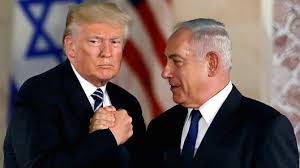 President Donald Trump promised during his 2016 campaign to relocate the American Embassy in Israel from Tel Aviv to Jerusalem, recognizing Jerusalem as the capital of Israel. This move has enraged Palestinians who claim Jerusalem as their capital and in retaliation many Palestinians have led violent protests, which have caused over 50 deaths so far.
President Donald Trump promised during his 2016 campaign to relocate the American Embassy in Israel from Tel Aviv to Jerusalem, recognizing Jerusalem as the capital of Israel. This move has enraged Palestinians who claim Jerusalem as their capital and in retaliation many Palestinians have led violent protests, which have caused over 50 deaths so far.
Many Palestinian sympathizers in America have once again found another axe to grind with “the Trump” on this issue, as he successfully made the embassy switch this week.
The naysayers claim that the President does not have this kind of unilateral authority to change the geographic region of the embassy in Israel or anywhere else in the world. Frustrated and upset, they are now looking to the courts to stop the move and restore our embassy back to Tel Aviv.
But just what does the Constitution say about this?
Article II, Section 2, of the United States Constitution states the President
“…shall nominate, and by and with the Advice and Consent of the Senate, shall appoint Ambassadors, other public Ministers and Consuls.”
In other words, the Senate has authority to confirm or deny the appointment of foreign ambassadors from the United States, but they do not define the terms of where or how that ambassador is to meet with foreign officials.
Article II, Section 3, of the United States Constitution explains the President’s authority on this matter, stating, “(He) shall receive Ambassadors and other public Ministers.”
This plain and simple wording in the Constitution means that the President maintains authority that is paramount over the other branches with regards to our relationship with other countries. To put a finer point on it, relationships with any and all foreign countries are within the sitting president’s jurisdiction.
What the Constitution does not do is give any jurisdiction, whatsoever, to the Judicial Branch.
Just consider, if the Court determines the power to choose the location in which the Executive Branch can meet foreign ambassadors, then who has that power? The Court would have to invent something that does not exist in the Constitution. Furthermore, there is absolutely no connection to the courts regarding this authority or the authority to speak to certain powers of the other respective branches of government.
The United States government does not serve at the pleasure of the Judicial Branch.
So, despite the United Nations, Palestinian sympathizers, or objections from the state of Palestine, the move of the American Embassy in Israel is constitutional, and, therefore, lawful.
 *** Jake MacAulay *** is a Life and Liberty News Contributor and serves as the Chief Operating Officer of the Institute on the Constitution (IOTC), an educational outreach that presents the founders’ “American View” of law and government. The former co-host of the syndicated talk show, The Sons of Liberty, he is an ordained minister and has spoken to audiences nation-wide, and has established the American Club, a constitutional study group in public and private schools.
*** Jake MacAulay *** is a Life and Liberty News Contributor and serves as the Chief Operating Officer of the Institute on the Constitution (IOTC), an educational outreach that presents the founders’ “American View” of law and government. The former co-host of the syndicated talk show, The Sons of Liberty, he is an ordained minister and has spoken to audiences nation-wide, and has established the American Club, a constitutional study group in public and private schools.
Learn more about your Constitution with Jake MacAulay and the Institute on the Constitution and receive your free gift.

